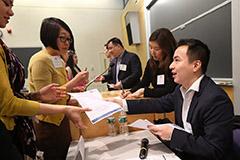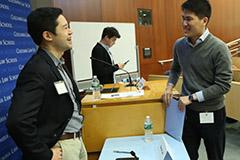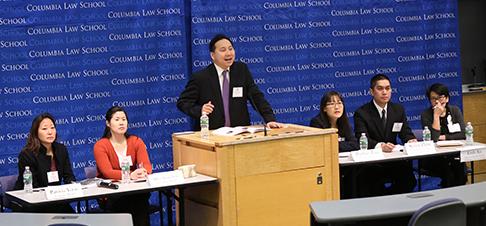Student Group Looks to Demystify Asian Stereotypes
Attendees at Columbia Asian Pacific American Law Association (APALSA) Fifth Annual Conference Discuss the "Model Minority" Myth and Dealing Effectively With the "Bamboo Ceiling."
New York, March 18, 2016—References to Asian Americans in the U.S. have for decades been preceded and modified by the adjective “model,” such as the term “model minority,” according to members of the Columbia Asian Pacific American Law Association (APALSA) who sought to dispel this label. On Saturday, Feb. 27, APALSA held a conference, “Not Your Model Minority: Where We’re Really From and Where We’re Going,” featuring a high-powered panel of lawyers, judges, and a legal journalist who addressed the “model minority myth––the idea that Asian Pacific Americans, as a whole, have succeeded in this country.”
| John Vang, senior counsel at the Center for Appellate Litigation; Stephen Chung, senior vice president of NBCUniversal Newsgroup; and Concepcion Montoya, partner at Hinshaw & Culbertson, at a panel discussion during the annual APALSA conference. |
Participants discussed the struggles around race that they described as having reached a boiling point in this past year, along with the challenges of identity they face as Asian American in this tense climate. Featured keynote panelists included:
- Sylvia Chin, partner at White & Case
- James Cho, Assistant U.S. Attorney for the Eastern District of New York
- David Lat, founder and managing editor of Above the Law
- Kyoko Lin, partner at Davis Polk & Wardwell
- Helen Wan, lawyer and author of The Partner Track
The Struggles of Being a ‘Model Minority’
During a discussion of the processes and barriers that serve to exclude those of Asian descent—commonly referred to as the “bamboo ceiling”—Danny Chun, acting judge on the Kings County Supreme Court, joked that he has been banging his head against the bamboo ceiling all his life, and that he’s lost all the hair at the top of his head. Sylvia Fung Chin, a partner at White & Case, agreed, saying that “a lot of external factors get internalized,” and that “a lot of people see Asians as worker bees.”
Strategies for Success
Panelists offered practical advice about career strategies. Steven Chung, senior vice president of NBCUniversal, said that “when you start at a law firm or with some other employer, you are going to come in as one of many. You need to stand out.” He added, “It takes a real understanding of the tapestry in which you are working to have a chance to progress and develop the kinds of relationships you need to succeed.”
| Jack Chen, in-house counsel at OnDeck, meets with Columbia Law students. |
Jack Chen, in-house counsel for the financial firm OnDeck, used his own experience to give an example of how he applies Chung’s advice to his work: “I read the firm’s releases, I figure out what the partners are doing, I build relationships.”
Making People-of-Color’s Voices Heard
A joint lunch panel with the Law School’s Black Law Students Association (BLSA) looked at the portrayal and casting of people of color in media. Daniel Klimek, actor and founder of Happy Man Films, Inc., said that in the entertainment industry, he is not “actually seen as an individual for my marketing qualities, but for my race, for my background.”
Brandon Frame, founder of TheBlackManCan, an organization that works toward promoting positive black male images, advocated the need for presenting the younger generation of Asian Americans with more positive images and role models. The panelists saw the media as key because, according to David Lat, lawyer, founder, and managing editor of Above the Law, media drives the conversation. “It’s what gets people talking,” he said. “It is important for us as people of color to have a seat at the table.”
Continued Struggle
Two additional panels looked at the nexus of Asian Americans and the LGBTQ community, and Asian Americans and mental health.
| Above the Law's David Lat, left, chats with a student. |
Speakers shared stories of their identity struggles as members of both communities, with John Vang, senior appellate counsel for the Center for Appellate Litigation, expressing frustration that “when I worked in the Bronx, my identity was not primarily LGBTQ, it was primarily Asian, and I think that’s an issue,” suggesting that in some places, people saw him as only Asian, and then looked no further.
The Partner Track
The conference wrapped up with a very personal discussion of the challenges of being Asian American, as lawyer-turned-novelist Helen Wan recounted her 13-year story of not just working at a big-law firm in New York City, but eventually writing her own story in the form of a novel, The Partner Track, published in 2013. She recalled the rejection she faced and detailed the conversations that accompanied those rejections, leaving the audience stunned at the blatant racism Wan described, and at the same time heartened by her persistence.
| Francis Chin, a committee chair at the Asian American Bar Association of New York and administrator at Brooklyn Law School, moderates a panel on mental health issues in the APA community. |



